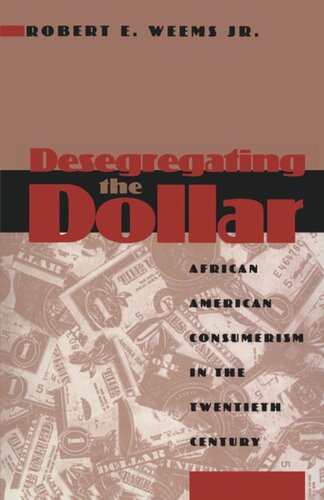

Most ebook files are in PDF format, so you can easily read them using various software such as Foxit Reader or directly on the Google Chrome browser.
Some ebook files are released by publishers in other formats such as .awz, .mobi, .epub, .fb2, etc. You may need to install specific software to read these formats on mobile/PC, such as Calibre.
Please read the tutorial at this link: https://ebookbell.com/faq
We offer FREE conversion to the popular formats you request; however, this may take some time. Therefore, right after payment, please email us, and we will try to provide the service as quickly as possible.
For some exceptional file formats or broken links (if any), please refrain from opening any disputes. Instead, email us first, and we will try to assist within a maximum of 6 hours.
EbookBell Team

4.1
30 reviewsCapitalism and slavery stand as the two economic phenomena that have most clearly defined the United States. Yet, despite African Americans' nearly $500 billion annual spending power, surprisingly little attention has been devoted to the ways U.S. businesses have courted black dollars in post-slavery America. Robert E. Weems, Jr., presents the first fully integrated history of black consumerism over the course of the last century.
The World War I era Great Migration of African Americans from the rural South to northern and southern cities stimulated initial corporate interest in blacks as consumers. A generation later, as black urbanization intensified during World War II and its aftermath, the notion of a distinct, profitable African American consumer market gained greater currency. Moreover, black socioeconomic gains resulting from the Civil Rights movement which itself featured such consumer justice protests as the Montgomery Bus Boycott, further enhanced the status and influence of African American shoppers.
Unwilling to settle for facile answers, Weems explores the role of black entrepreneurs who promoted the importance of the African American consumer market to U.S. corporations. Their actions, ironically, set the stage for the ongoing destruction of black-owned business. While the extent of educational, employment, and residential desegregation remains debatable, African American consumer dollars have, by any standard, been fully incorporated into the U.S. economy.
Desegregating the Dollar takes us through the "blaxploitation" film industry, the vast market for black personal care products, and the insidious exploitation of black urban misery by liquor and cigarette advertisers. Robert E. Weems, Jr., has given us the definitive account of the complicated relationship between African Americans, capitalism, and consumerism.